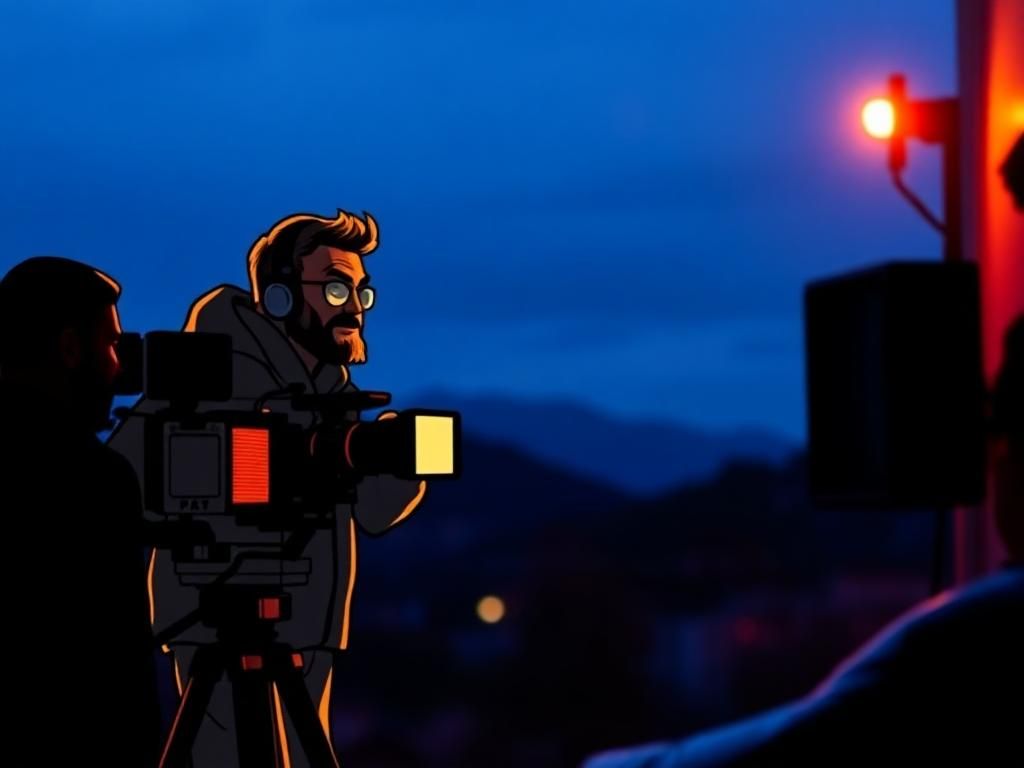Stephen Kay is a prominent director whose career has significantly impacted both film and television, reflecting a mastery of storytelling that resonates with audiences. His diverse body of work spans various genres, showcasing his adaptability and keen sense for narrative depth. Known for his notable films and acclaimed television series, Kay’s contributions have solidified his position as a respected figure in contemporary filmmaking.
Early Life and Background
Personal History
Born in 1961 in Los Angeles, California, Stephen Kay was raised in a family that had a profound appreciation for the arts. His upbringing in a culturally rich environment sparked his early interest in drama and storytelling. Kay’s family played a significant role in nurturing his artistic inclinations, encouraging him to explore the world of cinema from a young age. He pursued his passion through formal education, attending University of California, Los Angeles (UCLA), where he earned a degree in film and television.
Initial Exposure to Filmmaking
During his formative years, Kay developed a deep love for drama and the narratives that unfold through visual mediums. His initial exposure to filmmaking came from participating in local theater productions and creating short films. Under the mentorship of experienced directors and instructors at UCLA, he honed his craft, learning the intricacies of filmmaking that would later inform his directorial style. This early foundation would prove crucial as he transitioned into the professional arena.
Career Beginnings
Early Work
Kay’s early projects in film and television included a series of short films that garnered attention for their innovative storytelling techniques. His foray into television pilots provided him with essential industry experience, allowing him to understand the intricacies of script writing and directing for larger audiences. These initial endeavors laid the groundwork for what would become a distinguished career.
Rise to Prominence
Stephen Kay’s rise to prominence can be attributed to key projects that showcased his directorial talents. His transition from writing to directing was marked by significant successes, including projects that solidified his status as a director to watch in the competitive landscape of Hollywood. His ability to craft compelling narratives attracted the attention of major studios, paving the way for larger productions.
Notable Works
Film Projects
“Get Carter” (2000)
One of Stephen Kay’s most notable films is “Get Carter”, a gritty action-revenge thriller starring Sylvester Stallone. The film offers a modern twist on a classic narrative, following a hitman seeking vengeance for his brother’s death. The critical reception was mixed, yet it contributed significantly to the action genre, pushing boundaries and presenting complex characters. Kay’s direction brought a refreshing intensity to the film, confirming his prowess in handling dynamic storytelling.
“The Last Goodbye” (2000)
Another significant project in Kay’s repertoire is “The Last Goodbye”. This film explores themes of love, loss, and redemption against the backdrop of challenging realities. Kay’s adept direction is evident in the film’s poignant moments and emotional depth, distinguishing it as a noteworthy addition to his filmography.
Television Directing
“The 4400” (2004-2007)
Kay’s influence extended into television with his work on “The 4400”, a thought-provoking series that delves into the lives of 4400 people who mysteriously reappear after being missing for years. The show’s unique premise and character-driven storytelling earned it critical acclaim. Kay directed several significant episodes, contributing to the show’s cultural significance and exploration of pertinent social issues.
“Into the West” (2005)
His directorial work on “Into the West” is another illustration of Kay’s ability to tackle culturally rich narratives. This mini-series examines American history through the lens of diverse perspectives, allowing viewers to engage with often overlooked stories. Kay’s direction enhanced the narrative’s authenticity, making it a memorable exploration of history.
“The Shield” (2005-2006)
Kay also made a mark with his contributions to the groundbreaking series “The Shield”, which redefined modern crime dramas. This series intricately weaves themes of morality, justice, and corruption, showcasing the darker aspects of law enforcement. Kay’s direction in several pivotal episodes helped shape the series’ tone and narrative, influencing future crime dramas.
Other Significant Projects
Stephen Kay’s filmography includes several lesser-known works that reveal his versatility. He has directed documentaries that provide a lens into various topics, from social issues to personal stories, enriching his already diverse portfolio. His ability to tell stories across different formats showcases his dedication to the craft of filmmaking.
Creative Style and Themes
Directorial Approach
Kay’s directorial approach is characterized by a strong emphasis on technical style and visual storytelling. His films often feature dynamic cinematography, innovative editing techniques, and a deep engagement with the narrative structure that keeps audiences captivated. His unique style allows him to convey complex emotions and intricate plots effectively, establishing him as a distinctive voice in contemporary filmmaking.

Recurring Themes
Throughout his body of work, key recurring themes emerge that reflect Kay’s perspective on storytelling. His exploration of morality and justice is prevalent, with characters often facing ethical dilemmas that challenge their humanity. Additionally, his representation of human struggles resonates with audiences, offering a mirror to society’s complexities. Cultural and historical narratives further imbue his projects with depth and significance, making them relevant across generations.
Collaborations and Influences
Notable Collaborators
Throughout his career, Stephen Kay has collaborated with numerous actors, writers, and producers, creating a rich tapestry of artistic synergy. His frequent collaborations with talent in the film and television industries have enriched his storytelling and expanded his creative horizons. These partnerships have led to memorable and critically acclaimed projects that continue to impact viewers.
Influences on His Work
Kay’s work is heavily influenced by various directors and cultural narratives that shaped his vision. Influences from iconic filmmakers can be traced in his projects, as well as reflections of cultural and social dynamics that inform his stories. This interconnectedness highlights the significance of history and culture in his filmmaking process, enhancing the emotional resonance of his narratives.
Impact on the Industry
Awards and Recognitions
Stephen Kay’s contributions to film and television have not gone unnoticed, as evidenced by numerous nominations and awards from prominent organizations. His work has been recognized in various film festivals, showcasing his talents and dedication to the craft. These accolades not only validate his efforts but also position him as an influential figure in the industry.
Legacy and Influence
As a director, Kay’s impact on genre filmmaking is significant, influencing a new generation of directors and storytellers. His unique narrative style, coupled with his exploration of vital themes, has paved the way for evolving narratives in cinema. The legacy he leaves behind is one that will inspire future filmmakers to explore complex storytelling.
Future Projects and Aspirations
Upcoming Works
Currently, Stephen Kay is involved in several exciting projects that are generating anticipation among audiences and industry insiders alike. His upcoming works promise to further showcase his directorial prowess and creative vision. As he continues to evolve, fans eagerly speculate about the future directions Kay will take as a director, especially in light of the changing landscape of film and television.
Vision for the Future of Filmmaking
In an ever-evolving industry, Stephen Kay maintains a clear vision for the future of filmmaking. He emphasizes the importance of innovation in storytelling, stressing the need for authenticity and representation. His perspective on current trends speaks to the necessity for creators to adapt and push boundaries, ensuring that the art of storytelling continues to thrive.
Conclusion
The journey of director Stephen Kay through the realms of film and television is a testament to his creative brilliance and profound storytelling ability. His works have not only entertained but also challenged audiences to engage with the deeper themes of humanity, justice, and culture. As his career progresses, his contributions will undoubtedly continue to shape the industry and inspire filmmakers for years to come.
References/Further Reading
Frequently Asked Questions (FAQ)
-
What are some of director Stephen Kay’s most notable projects?
Stephen Kay is known for “Get Carter,” “The 4400,” and “The Shield,” among others.
-
How did Stephen Kay influence the action genre?
His work on “Get Carter” added depth to character-driven narratives within the action genre.
-
What themes does Stephen Kay frequently explore in his films?
Kay often examines morality, justice, and cultural narratives in his storytelling.
-
Where did Stephen Kay receive his education?
He attended the University of California, Los Angeles (UCLA), where he studied film and television.
-
What impact has Stephen Kay had on upcoming directors?
His diverse body of work and unique storytelling approach inspire and influence newer directors in the industry.
-
What current projects is Stephen Kay working on?
He has several upcoming works, expanding his creative presence in the industry.
-
How did Kay transition from writing to directing?
His early work in screenwriting paved the way for him to effectively take on directorial roles.
-
Has Stephen Kay received any awards for his work?
Yes, he has garnered several nominations and awards from various film organizations and festivals.
-
What role does collaboration play in Kay’s work?
Kay frequently collaborates with talented actors, writers, and producers, enhancing the quality and depth of his storytelling.
-
What is the overall significance of Stephen Kay’s contributions?
His contributions have shaped modern filmmaking, particularly in the genres he has worked in, making profound impacts on audiences.
| Year | Project | Type | Significance |
|---|---|---|---|
| 2000 | Get Carter | Film | Redefined action narratives |
| 2004-2007 | The 4400 | Television | Explored social themes and supernatural elements |
| 2005 | Into the West | Mini-Series | Unique cultural storytelling |
| 2005-2006 | The Shield | Television | Influential in modern crime drama |



